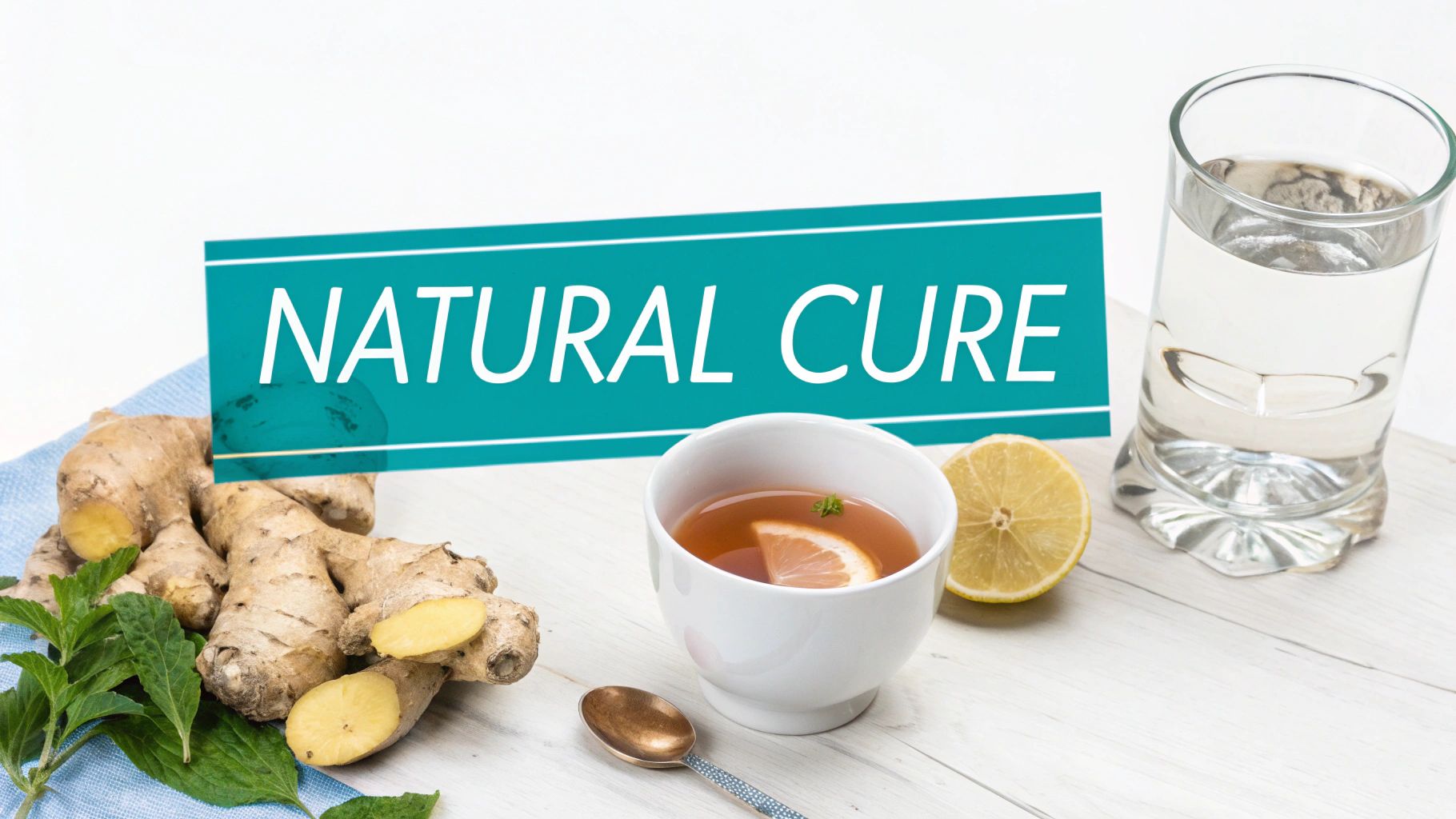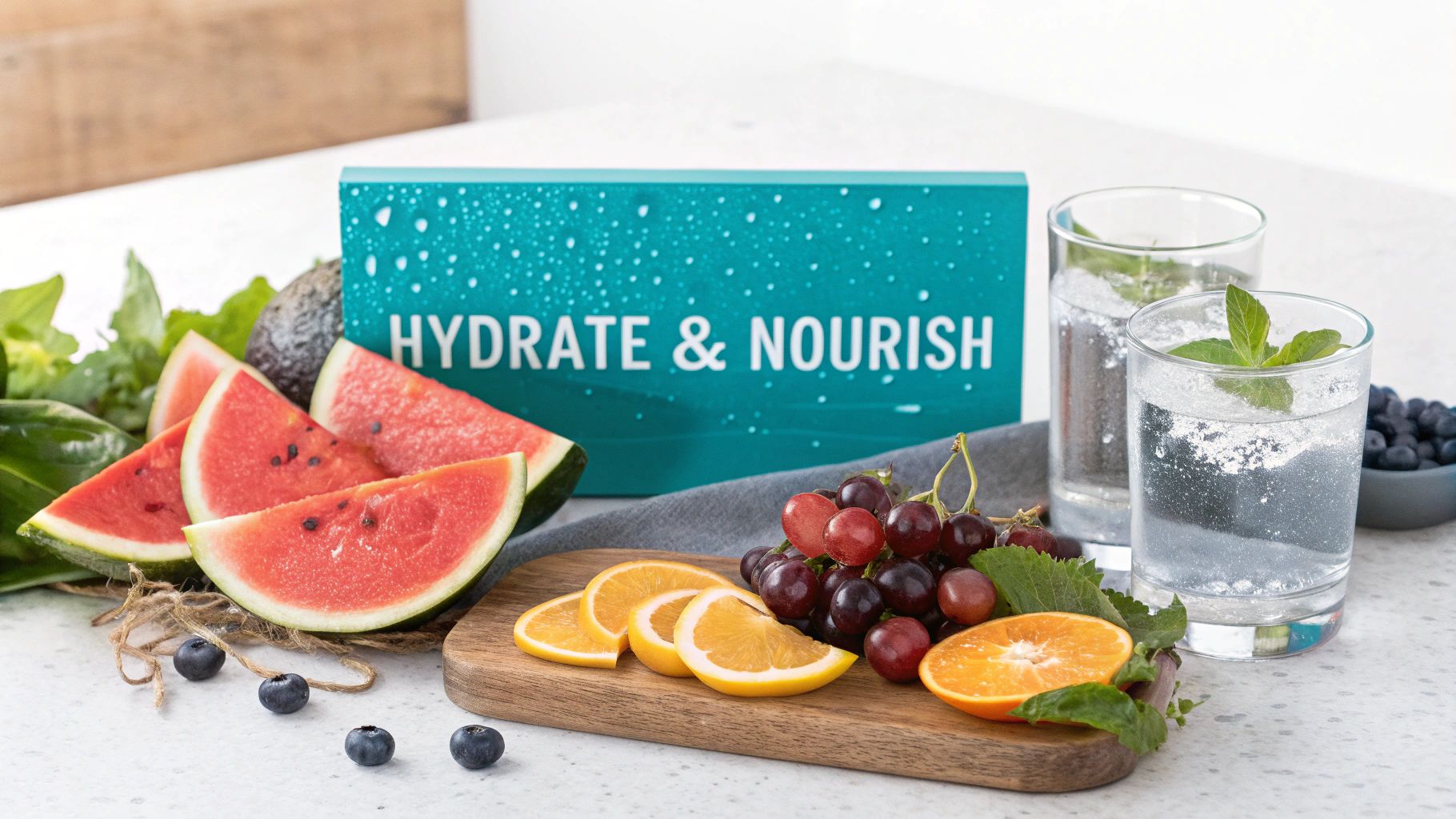

· By Annemarie
Top Hangover Nausea Remedy Hacks That Actually Work
Why Your Body Rebels: The Science of Hangover Nausea

That awful morning-after nausea isn’t just a consequence of having fun; it’s your body’s complex biological reaction to alcohol. Alcohol, or ethanol, directly irritates the stomach lining, similar to the way spicy food does. This irritation can lead to inflammation and increased gastric acid production, both of which contribute to nausea. Essentially, your stomach is physically rejecting the alcohol.
Alcohol also disrupts your normal digestive rhythm. It slows down gastric emptying, which is the process of moving food from your stomach to your intestines. This slowdown causes food to build up in your stomach, worsening the nausea. Imagine it as a traffic jam in your digestive system.
Furthermore, alcohol throws off your body’s blood sugar regulation. It causes an initial spike followed by a significant drop, which can also lead to nausea. In addition, alcohol dehydrates you, making all hangover symptoms, including nausea, even worse. Dehydration reduces blood volume, potentially making you feel lightheaded and queasy.
Is There a Magic Bullet for Hangover Nausea?
Finding a hangover nausea cure has been more rooted in folklore than science. About 75% of people who drink to intoxication experience hangovers, including nausea. The only guaranteed way to avoid them is moderation. Learn more about hangovers here. While some traditional remedies, such as antacids, might provide temporary relief by neutralizing stomach acid, they don't specifically address hangover-related nausea. For instance, taking an antacid might ease the immediate burning sensation, but it won't fix the underlying digestive disruption.
When Nausea Needs More Than a Home Remedy
It’s important to recognize when hangover nausea becomes more serious. While mild nausea is typical, severe or persistent vomiting can cause dehydration and electrolyte imbalances requiring medical care. If your nausea is coupled with other symptoms such as severe abdominal pain, confusion, or blurred vision, seek immediate medical evaluation. These could indicate a more serious issue. Paying attention to your body and seeking professional help when needed is essential for a safe and quick recovery.
Rehydration Revolution: Beyond Just Drinking Water
Dehydration significantly worsens hangover nausea. However, effectively rehydrating after a night of drinking involves more than just water. It requires replenishing the vital fluids and electrolytes lost while consuming alcohol. This helps restore your body's balance and alleviate nausea more effectively.
Timing Is Everything: When to Hydrate
A key tactic is beginning your rehydration strategy before going to sleep. This preemptive measure can greatly reduce the severity of next-day nausea. Think of it as preparing your body for a smoother recovery. Continue hydrating throughout the night if you wake up, and consistently the next morning.
The Electrolyte Equation: More Than Just Water
Water is essential, but it isn't the complete solution for hangover nausea. Alcohol depletes your body of electrolytes like sodium and potassium, crucial for proper cell function. Replenishing these electrolytes can significantly reduce nausea. Sports drinks can help, but they often contain high amounts of sugar, which may worsen nausea for some. Consider lower-sugar electrolyte solutions or coconut water, naturally rich in electrolytes.
The Right Fluids for Relief
Choosing the right beverages can make a real difference. Avoid highly acidic juices, which can irritate your sensitive stomach. Herbal teas like ginger or chamomile can soothe the digestive system and ease nausea. Broth-based soups also offer hydration and easily digestible nutrients.
Globally, hangover nausea remedies focus on rehydration and symptom management, not directly addressing the biological mechanisms causing nausea. Products like sports drinks and IV treatments are popular for replenishing electrolytes. However, research doesn't establish a direct link between electrolyte balance and hangover severity. Find more detailed statistics here. Nausea is often treated with antacids and bland foods to soothe the stomach.
Personalized Hydration: How Much Do You Need?
Individual hydration needs vary based on factors like body weight and alcohol consumed. A general rule is to drink 16-20 ounces of fluid for every 12 ounces of beer or 5 ounces of wine. Listen to your body and adjust as needed. If even small sips are difficult due to severe nausea, try sucking on ice chips or taking small, frequent sips of clear liquids. This gradually hydrates you without upsetting your stomach. This step is crucial, as your body needs fluids to flush out toxins and begin recovery.
To help illustrate the various hydration options, let's compare some common choices. The following table summarizes their effectiveness, speed of relief, accessibility, and cost.
Hangover Hydration Solutions Comparison
| Hydration Solution | Effectiveness for Nausea | Speed of Relief | Accessibility | Cost |
|---|---|---|---|---|
| Water | Moderate | Moderate | High | Low |
| Electrolyte Drinks | High | Fast | Medium | Medium |
| Coconut Water | Medium | Medium | Medium | Medium |
| Herbal Tea (Ginger/Chamomile) | High | Medium | Medium | Low-Medium |
| Broth-Based Soups | Medium | Slow | Low-Medium | Medium |
As you can see, different solutions offer varying levels of benefit. While water is readily available and inexpensive, electrolyte drinks offer faster relief. Herbal teas are a good middle ground, providing good effectiveness and moderate accessibility.
Rehydration is essential for recovering from hangover nausea. However, it's not a universal solution. By understanding how to hydrate strategically, choosing appropriate fluids, and paying attention to your body, you can manage this difficult hangover symptom and get back to feeling your best. Remember, these strategies can greatly impact your recovery.
Nature's Nausea Fighters: Plant-Based Recovery Solutions

Beyond the pharmacy aisle, nature provides a wealth of options for tackling hangover nausea. Many plant-based remedies offer gentle and effective relief from stomach upset. Let's delve into some of these natural nausea fighters and see how they can become your go-to hangover recovery strategy.
The Power of Ginger
Ginger, a cornerstone of traditional medicine, boasts gingerols, powerful compounds with significant anti-nausea properties. Gingerols work their magic by blocking specific receptors in the gut that trigger the vomiting reflex. Steeping a small piece of fresh ginger in hot water creates a soothing ginger tea. This simple preparation allows the beneficial gingerols to infuse into the water, creating an easily absorbable remedy for hangover nausea. You might be interested in: checking out our blog articles.
Peppermint's Soothing Effects
Peppermint, with its refreshing aroma, contains menthol compounds known to relax stomach muscles and ease feelings of nausea. This can help alleviate the cramping and discomfort often associated with a hangover. Peppermint tea, much like ginger tea, is a popular way to experience these soothing effects. Even simply inhaling the scent of peppermint oil can sometimes provide relief.
Chamomile's Calming Embrace
Chamomile, renowned for its calming properties, contains apigenin, an antioxidant that can help reduce inflammation in the gut. This inflammation is often a significant contributor to hangover nausea. A warm cup of chamomile tea, brewed with dried chamomile flowers, can be a gentle yet effective way to settle an upset stomach. It's worth noting, however, that chamomile may interact with certain medications. Consulting with your doctor is always recommended if you have any concerns.
Combining Herbal Remedies
Combining certain herbal remedies can create a synergistic effect, providing even stronger relief from hangover nausea. For instance, brewing a tea with both ginger and peppermint offers the combined benefits of both herbs, working in tandem to calm the stomach and reduce inflammation. This dual-action approach targets multiple aspects of hangover nausea, resulting in more complete relief. You might find that using these herbs together provides significantly greater comfort compared to using them individually.
Quality and Preparation Matter
When using herbal remedies, quality sourcing is crucial. Opt for organic herbs from reputable brands whenever possible. Proper preparation also plays a key role in effectiveness. Over-boiling ginger, for example, can reduce the potency of its gingerols. Similarly, using old or dried-out peppermint leaves can diminish their effectiveness. Understanding the nuances of preparation and usage allows you to maximize the potency and therapeutic benefits of these plant-based solutions.
Debunking Myths and Misconceptions
While many natural remedies offer genuine benefits, it’s important to be discerning and aware of those lacking scientific backing. Numerous traditional “cures” rely more on folklore than evidence. For instance, some believe that drinking coffee helps alleviate hangover nausea. However, coffee can dehydrate you further, potentially exacerbating nausea. Prioritizing evidence-based remedies and avoiding those that may worsen symptoms ensures a safer and more effective recovery.
Pharmaceutical Approaches: When to Reach for the Medicine Cabinet

Sometimes, natural remedies just aren't enough for a brutal hangover. If your nausea is severe, over-the-counter medications can provide much-needed relief. But it's important to choose wisely and understand how these medications work.
Understanding Over-the-Counter Options
Several OTC medications can help alleviate that queasy feeling. The key is to select medications that target the specific causes of your discomfort. Don't just grab anything for general upset stomach. A healthy gut can also play a role in processing those hangover-inducing substances. Check out some expert advice on how to heal your gut.
The following table provides a quick guide to common OTC medications for hangover nausea. It details the active ingredients, how they work, safety considerations, and typical relief time.
OTC Hangover Nausea Medications Guide
| Medication Type | Active Ingredients | How It Works | Safety Considerations | Typical Relief Time |
|---|---|---|---|---|
| Bismuth Subsalicylate | Bismuth subsalicylate | Protects the stomach lining and reduces inflammation. | Avoid if allergic to aspirin or salicylates. | 30-60 minutes |
| Antacids | Calcium carbonate, magnesium hydroxide | Neutralizes stomach acid. | Can interact with other medications. Consult a doctor if you have concerns. | 15-30 minutes |
| Antihistamines | Dimenhydrinate, meclizine | Blocks histamine receptors, which play a role in nausea and vomiting. | Can cause drowsiness. Avoid driving or operating machinery after taking. | 30-60 minutes |
These medications can be effective, but it's crucial to use them responsibly.
Safety First: Mixing Medications and Alcohol
Be very careful about mixing medications with any remaining alcohol in your system. Some medications can interact negatively with alcohol, either increasing the risk of side effects or reducing the medication's effectiveness. For example, combining acetaminophen (a common ingredient in pain relievers) with alcohol can cause liver damage. Always read medication labels carefully and check for warnings about alcohol interaction. If you're unsure, consult a pharmacist or doctor.
Individuals with underlying health conditions should be extra cautious. Some medications might worsen existing conditions or interact negatively with prescribed medications. Always discuss your full medical history with your doctor or pharmacist before taking any new medication, even OTC remedies.
Timing and Effectiveness
When you take medication can significantly impact both how well it works and your safety. Taking some medications on an empty stomach, for instance, might increase the risk of irritation. Others absorb better when taken with food. Always adhere to the instructions on the medication label for proper timing and dosage.
Recognizing When to Seek Professional Help
While over-the-counter options can offer relief, it's important to know when your symptoms warrant professional medical attention. Persistent vomiting, intense abdominal pain, or other unusual symptoms should prompt a trip to the doctor. These could signal a more serious condition requiring immediate treatment.
Minimizing Side Effects
To reduce the chances of side effects, always follow the recommended dosage on the label. Start with the lowest effective dose and increase gradually only if needed. This approach can help minimize the risk of adverse reactions. Staying well-hydrated is also crucial. It helps your body process the medication more efficiently and can lessen potential side effects.
By understanding how OTC medications work, their potential side effects and interactions, you can make informed choices about managing hangover nausea. This knowledge allows you to maximize relief and minimize risks for a safer and more comfortable recovery. Remember, responsible alcohol consumption is always the best strategy.
Strategic Eating: Food Timing That Calms Your Stomach
Waking up after a night out with a churning stomach? Your food choices can make all the difference. While some foods can ease your hangover nausea, others can make it much worse. Let's explore how to eat strategically to support your body's recovery.
Nutrient Timing for Nausea Relief
After alcohol consumption, replenishing specific nutrients is key to calming your stomach. Complex carbohydrates, found in whole grains, offer sustained energy and help stabilize blood sugar, reducing nausea caused by blood sugar swings. A small bowl of oatmeal is a gentle way to start.
Potassium, often depleted due to alcohol's diuretic effect, is crucial for nerve and muscle function, impacting digestive health. Bananas are an excellent source of potassium and are usually easy to digest even when nauseous. Adding these foods to your post-drinking routine can make a significant difference.
Optimal Meal Timing
When you eat matters just as much as what you eat. A small snack before bed can help absorb alcohol and stabilize blood sugar, lessening morning nausea. Avoid heavy, greasy foods before sleep, as these can strain your digestion. Try toast with honey or a few crackers. For more tips, check out our additional resources.
If you wake up nauseous, start with bland foods like plain toast or crackers. As your symptoms ease, gradually reintroduce more substantial, easily digestible foods. This prevents overwhelming your stomach and promotes a smoother recovery.
Portion Control for Sensitive Stomachs
Even healthy foods can aggravate nausea if you eat too much. Begin with small portions and gauge your body's response before eating more. This allows your digestive system to recover gently.
Debunking the Greasy Breakfast Myth
Contrary to popular belief, a greasy breakfast often hinders recovery. Fatty foods are hard to digest, especially when your system is already stressed. They can slow digestion, increasing nausea and prolonging recovery. Choose nutrient-rich, easily digestible options instead.
Gentle Carbohydrates for Recovery
Not all carbs are equal when it comes to hangovers. Simple sugars in processed foods can worsen blood sugar fluctuations and nausea. Focus on complex carbohydrates from whole grains, fruits, and vegetables for sustained energy without upsetting your stomach.
Gradual Dietary Progression as Symptoms Improve
As your nausea fades, gradually add variety back into your diet. Start with digestible proteins like eggs or chicken and incorporate more fresh fruits and vegetables. This helps your digestive system return to normal without further distress. Listen to your body and give it the support it needs to recover.
Industry Innovations: Navigating the Hangover Remedy Market

The market for hangover remedies is exploding with options, some promising, others less so. Finding a product that truly helps requires understanding the science behind the claims, separating genuine innovation from clever marketing. Increased alcohol consumption fuels this market growth, particularly in places like California and New York.
The U.S. hangover cure market, valued at USD 511.0 million in 2024, is expected to grow at a 14.4% CAGR from 2025 to 2030. This rise is driven by the demand for quick relief, with products like effervescent tablets and rehydration drinks leading the way. These products aim to tackle both hangover symptoms and dehydration.
Many include electrolytes like sodium and potassium to replace lost fluids. However, the science behind their direct effect on hangover severity is still evolving. More detailed statistics on market growth can be found here.
Ingredients: Separating Fact From Fiction
Many hangover products boast long lists of trendy ingredients. But the real question is: do these ingredients actually relieve nausea? Some products emphasize vitamin B complex or milk thistle, often promoted for liver support.
However, research directly linking them to hangover nausea relief is limited. This emphasizes the importance of scrutinizing ingredient lists. Prioritize products featuring ingredients with proven benefits, like ginger or electrolytes. Interested in seeing some examples? Check out our product listings. Understanding how different ingredients work can help you choose wisely.
Delivery Methods and Effectiveness
How a hangover remedy is delivered plays a big role in how quickly and effectively it works. Effervescent tablets, dissolving rapidly in water, allow fast absorption. This makes them well-suited for addressing nausea quickly.
Capsules or pills, conversely, must be digested, which can be a slower process, especially when nausea is already present. If nausea tends to be triggered by an empty or overly full stomach, consider developing a consistent meal schedule. Check out these helpful meal prep hacks to reduce dinnertime stress.
Realistic Expectations and Red Flags
It's crucial to be realistic about what hangover remedies can do. No product can completely erase the effects of excessive alcohol consumption. Be skeptical of "miracle cure" claims. These often lack scientific support and can create unrealistic expectations.
Seek out products that transparently explain how they work, focusing on symptom management and support, not a complete cure. Also, be wary of products that rely heavily on testimonials instead of scientific evidence. While testimonials can offer some anecdotal support, they shouldn't be your primary source for judging a product's efficacy.
Prevention Mastery: The Ultimate Hangover Nausea Remedy
The best way to combat that dreaded hangover nausea? Prevent it before it starts. This doesn't mean swearing off alcohol altogether, but it does mean being smart about your drinking habits. Let's dive into some proven strategies to help you wake up feeling refreshed.
Pre-Drinking Preparation: Setting the Stage for Success
What you do before you start drinking makes a world of difference. A good meal beforehand is key. Think complex carbohydrates, healthy fats, and protein. This creates a buffer in your stomach, slowing alcohol absorption and easing its irritating effects. Salmon, brown rice, and steamed vegetables are a great option.
Hydration is also essential, both before, during, and after you drink. Staying hydrated helps your body detoxify and counteracts the dehydrating effects of alcohol, a major culprit in nausea.
Pacing Yourself: The Art of Moderation
Pace yourself. Your liver can only process so much alcohol per hour—typically about one standard drink. Drinking more than that leads to a buildup of acetaldehyde, a toxic byproduct of alcohol metabolism and a major contributor to hangover symptoms.
Spacing out your drinks allows your body to keep up, minimizing the risk of a nasty hangover. A simple trick is to alternate alcoholic beverages with water. This helps you pace yourself and stay hydrated throughout the night.
Choosing Your Beverages Wisely: Impact on Nausea
Not all alcoholic beverages are the same. Darker liquors like whiskey and rum contain higher levels of congeners, chemicals that contribute to worse hangovers and more nausea. Lighter drinks like vodka or gin might be a gentler choice.
Knowing Your Limits: Calculating Your Personal Alcohol Timeline
Understand your body's alcohol processing capacity. Factors like weight, gender, and metabolism all play a role. Knowing your limits and respecting them prevents you from overloading your system and triggering nausea. Online BAC calculators can help you estimate your blood alcohol content based on your individual characteristics and alcohol consumption.
Post-Drinking Interventions: Minimizing Next-Day Suffering
Even with the best preventative measures, some lingering effects can occur. Take steps before bed to minimize the damage. Drink a large glass of water and have a light snack to help your body rehydrate and stabilize blood sugar levels. If you wake up feeling nauseous, try sipping on ginger ale or peppermint tea, both known for settling upset stomachs.
Social Strategies: Navigating Real-World Situations
Putting these practices into action in social settings can be tricky. Planning ahead helps. Designate a driver or arrange transportation so you can control your alcohol intake. Let your friends know your limits to avoid pressure to drink more than you're comfortable with. Your well-being comes first.
Building Better Habits: Long-Term Prevention
Consistent prevention strategies lead to healthier drinking habits over time. Mindful drinking, paying attention to your body's signals and making conscious choices about your alcohol consumption, is a valuable practice. It allows you to enjoy social events without sacrificing your health.
Preventing hangover nausea is all about proactive choices. By understanding how alcohol affects you and adopting these strategies, you can significantly reduce the likelihood of a rough morning after. Take control of your drinking experience and enjoy social occasions without the worry of debilitating nausea.
Ready to take control of your mornings after? Upside Hangover Sticks offer a convenient and effective way to support your body's natural recovery process. Try Upside today and experience the difference!
